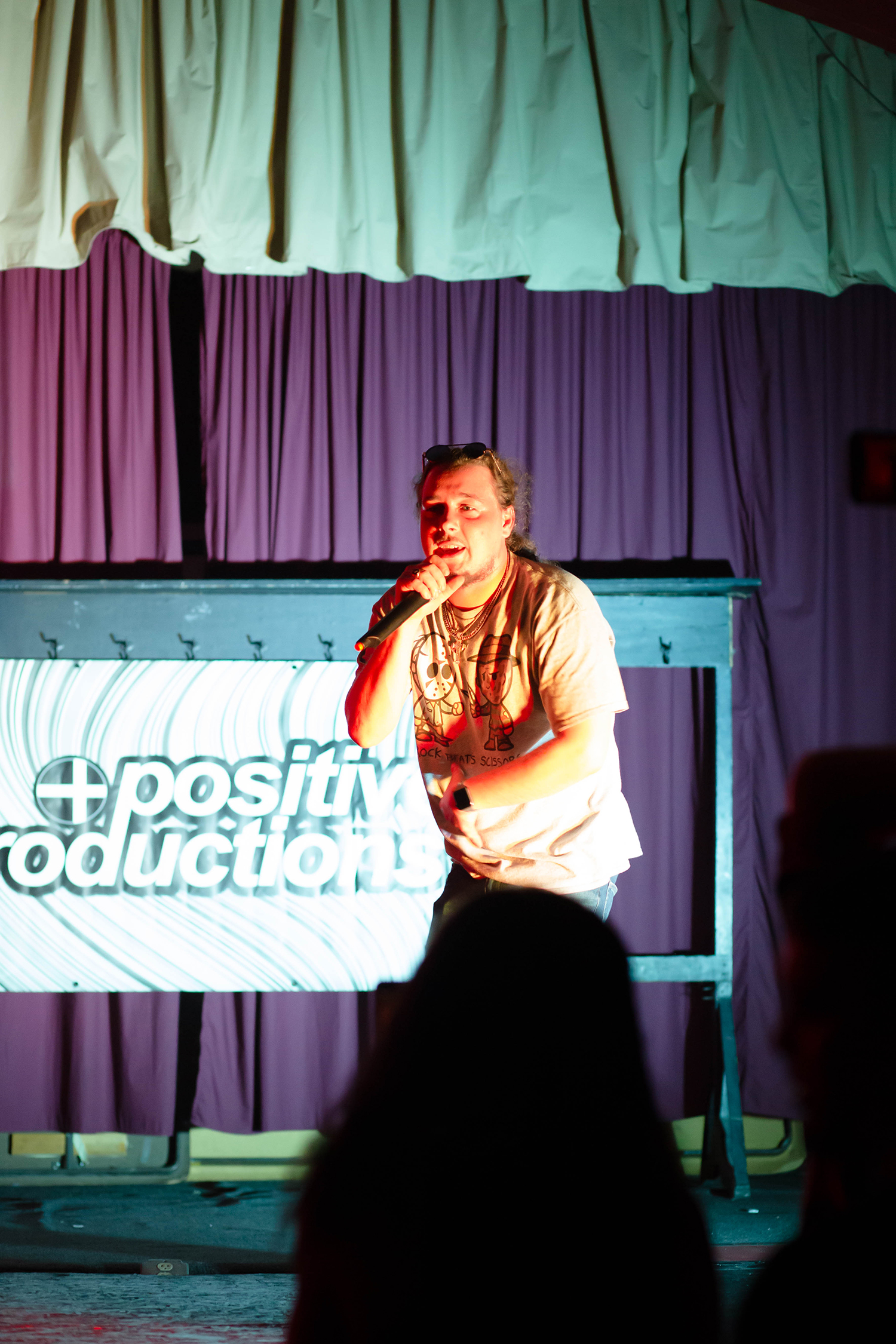Somewhere in the valley at the start of 2018, a wave was born, boasting bleak braggadocio and hometown star power as its strengths.
Rising in the small town of Ironton, Ohio was a series of independent hip hop shows in various venues downtown, notably a revitalization of the Elks Lodge 177.
Strong, decades-old local connections popularized the movement led by two camps – HighLife and PositiveProductions – as they featured droves of emerging regional talent to become a breeding ground for distinctive links among the region.
It is important to examine the context here. Ironton is a small and declining rust belt town in a similarly battered region heavily-influenced by its aging population of blue-collar workers, yet saw enough of a demand for quality entertainment for younger folks who have been more influenced by the wider palette of Internet media.
I first became involved in the scene doing photography for artists in the scene. I had met rapper and singer Rob Pimp on a movie set the year prior, and an instant connection between one new group of friends led to direct collaborations with another group of friends across the river.
I hopped on board in 2016 and it peaked in 2018, but I had always heard stories about the early days, so I decided to sit down with Rob Pimp and Klique for a brief interview about the beginnings of the scene.
How did everything start? Cause I wasn’t there for the beginning of it. Like, early days of it.
Rob Pimp: You’d get a thousand different answers. I was already making music at 15. My buddy Mikey got me into writing and then me and Mac would be in like the gym in school at Ironton at lunch. And we’d just be in a cypher rapping, and I’d pull out writtens. Not physically pull them out but memorize them, and I’d rap one of my writtens. Eventually Mac’s was the first place that I recorded music. Went there and recorded nine songs in one day, but it’s like we pulled up and I had it written already, and rapped them one after another. And that would be me starting to release music. We had what we called “The Label” back in the day. That was a little collective of us. And then the collective name has kinda just changed over time multiple times, and then people have had falling outs with each other, but we’ve really been one big group of artists the whole time.
Were you all the first artists in Ironton or was there a wave before you all?
Rob Pimp: It’s like in the early 2000s you had people that called themselves ITC, and they were the I-Town Crips or whatever. They were trying to be hardcore gangster rap cause that’s what was prevalent at the time. They were the only ones that were the precursors to us. If somebody asks me who were the first ones to really create the scene in Ironton, I’d say me, Mac Carter, Tevin (Kwame), and LA, really started the scene, and then everybody else came in and made it bigger and bigger but when it comes to who first started rapping, they were the ones before me.
I probably didn’t start writing til like Tha Carter III, little bit before Tha Carter III era so probably like ‘07. Probably started writing in ‘06 or ‘07, didn’t really record anything until ‘09. Freshman year, eighth grade maybe.
What do you all feel like were the biggest accomplishments that you made?
Rob Pimp: The whole Positive Productions run is a big accomplishment in my eyes. I loved that run, you know, being able to organize the shows that we did, I would consider PosPros a success. We were trying to do stuff and we were semi-successful, and that all led to like opening for Afroman, all that stuff. It’s hard to give a milestone but 2018 was the most successful year.
It was a wave. It really was. Any personal favorite highlights?
Rob Pimp: That weekend in general was a big highlight for me because we had our Memorial Day show, then we opened for Afroman, and then we had a little cookout at my place, so that whole weekend was pretty dope.
Do you think the scene is dead or do you think it’s coming back?
Klique: Like it was? I don’t know. It’s tough to say. It’s different now. We used to all live beside each other and that made things easy. I don’t know. I don’t want it to be a local scene as much. Focusing on the small-time stuff just holds you back and you’ll never be anything bigger.
So you wanna go global?
Klique: I just wanna get 1000 fans who are legitimate fans that if I was to put out a $10 shirt 1000 people would buy it, and then from there, you know. You can live off of that.
Rob Pimp: I wouldn’t say we’re statewide as artists but I’d say we’re regional. I wouldn’t say we’re local artists.
Conclusion
Local, regional, global. I’ve always seen massive potential for this group of artists and the groundwork they’ve laid for the next generation of artists.
With lots of local talent popping up throughout the region, it’s important to pay homage to the artists that preceded them, even when those artists are still young enough to make hit records and put on incredible shows.
It’s safe to say that I miss those days. The scene faced some internal problems and being the counterculture of Ironton, was suppressed by the city government in as many ways as possible. It couldn’t survive the lack of funding and lack of support from the city itself.
But where there’s a will, there’s a way, and I believe the will is still there. We just have to focus on empowering our artists the best that we can and giving them our undying support. The artists make this place special!

